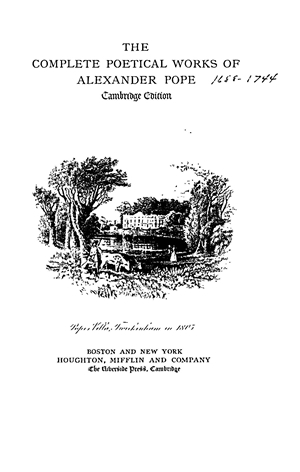
The Complete Poetical Works of Alexander Pope
- Alexander Pope (author)
- Henry W. Boynton (editor)
This collection includes Pope’s poems, translations of Ovid and Homer, An Essay on Criticism, The Rape of the Lock, An Essay on Man, and his Moral Essays.
Key Quotes
War & Peace
Two cities radiant on the shield appear, The image one of peace, and one of war. Here sacred pomp and genial feast delight, And solemn dance, and Hymeneal rite;… There, in the Forum swarm a numerous train; The subject of debate, a townsman slain: One pleads the fine discharged, which one denied,…
Economics
So drives Self-love thro’ just and thro’ unjust, [269] To one man’s power, ambition, lucre, lust: The same Self-love in all becomes the cause Of what restrains him, government and laws. For, what one likes if others like as well, What serves one will, when many wills rebel? How shall he keep what,…